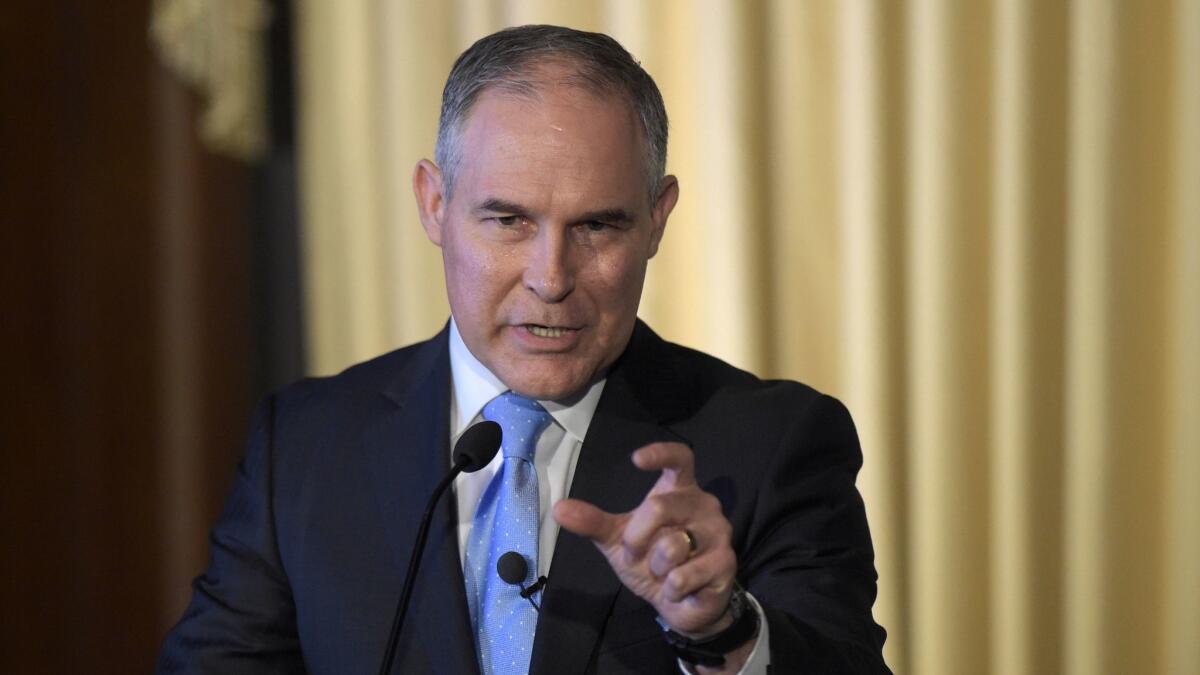Op-Ed: According to Scott Pruitt, states only have the right to pollute, not protect their environments

- Share via
Throughout his confirmation hearing and in a recent interview, EPA Administrator Scott Pruitt wrapped himself in the mantle of federalism, calling the shared distribution of power between the federal government and states a “bedrock principle” of environmental laws. Pruitt accused the Obama administration of intruding on the autonomy that environmental laws give to the states and vowed to set this balance right.
But Pruitt’s views are inconsistent with any coherent vision of federalism. His zeal for preserving the autonomy of states is limited to states that favor less stringent environmental protection. As he prepares to implement executive orders on environmental regulations, Pruitt’s misguided approach could threaten safeguards for clean air and water in California and around the country.
Left to their own devices, states cannot effectively control pollution that travels across state lines. Each state has an incentive to attract industry and overlook pollution that affects residents of other states. For this reason, since 1977, the Clean Air Act has had a “good neighbor” provision to constrain such pollution.
Pruitt is clearly willing to trample on state efforts to provide citizens with cleaner air and instead prioritize the interests of polluters.
The Obama administration issued a regulation under this provision, the Cross-State Air Pollution Rule, to allocate pollution reductions between upwind states (many in the Midwest) and downwind states (many in the Northeast) and to minimize the costs of meeting air-quality standards. As attorney general of Oklahoma, Pruitt challenged this rule, which placed more stringent requirements on upwind states that had taken fewer steps to control emissions, and which could therefore make reductions most cheaply.
Although Pruitt had expressed great concern about the costs of regulation in other contexts, he argued in Supreme Court litigation that the EPA had erred in pursuing this strategy and instead should have given a break to the upwind states. The court disagreed in a 6-2 vote, but Pruitt said in his confirmation hearing that the EPA was wrong to allocate pollution-reduction requirements this way.
This is not about a clash between the federal government and states, but rather between states that have different interests. The federal government has a statutory responsibility to adjudicate these competing interests to promote the health of all Americans. But Pruitt’s vision would create incentives for states to evade federal law and drag their feet, causing tens of thousands of premature deaths and hundreds of thousands of additional cases of aggravated asthma in downwind states due to particulates and smog, according to the EPA’s regulatory impact analysis, not to mention damaging scenic vistas in national parks and wilderness areas.
Though Pruitt opposes federal interference with state policies that favor polluters, he seems entirely open to meddling with state efforts to reduce emissions within their borders. When the Clean Air Act empowered the EPA to regulate car and truck emissions, it gave California the authority to set more stringent vehicle standards, because the state already had a regulatory program in place. Under the persistent questioning of Sen. Kamala Harris, Pruitt was noncommittal about the future of California’s program. This is especially galling because the Clean Air Act also has a provision that gives other states the choice of choosing California’s standards over more lax federal standards. In recent years, more than a dozen states have done so.
Pruitt is clearly willing to trample on state efforts to provide citizens with cleaner air and instead prioritize the interests of polluters, including an auto industry that has repeatedly cried wolf about regulatory proposals yet benefited enormously from a federal rescue after the financial crisis.
He misled the Senate during his hearing when he said that EPA waivers, which allow California to have more stringent vehicle standards, had “been granted at times and denied at times,” suggesting that if he failed to grant them, he wouldn’t be departing from established precedent. In fact, out of more than 100 waiver requests, only one was denied outright, and the decision was later reversed.
He also used false and misleading statistics in order to characterize his polluter-friendly approach as a return to normality after eight years of alleged overreach by the Obama administration, saying that the EPA issued five federal implementation plans during the presidencies of George H.W. Bush, Bill Clinton and George W. Bush combined, but 56 during the Obama administration. In fact, the Reagan and George W. Bush administrations issued 29 and 30 implementation plans, respectively. And the Obama administration’s plans were needed: The Supreme Court endorsed the use of half of these plans, while all but two of the others either coordinated regional solutions or were legally required due to the inaction of states.
Pruitt’s incoherent approach is neither logical nor consistent with history. He seems to think that states have an inviolable right to protect the financial interests of heavily polluting industries, but not the health of their own citizens. This is not a vision of federalism that the drafters of our environmental laws — nor the drafters of our Constitution — would recognize.
Richard L. Revesz is a professor of law and dean emeritus at New York University School of Law, where he directs the Institute for Policy Integrity.
Follow the Opinion section on Twitter @latimesopinion or Facebook
MORE FROM OPINION
Alaska’s national refuges are not private game reserves
The federal bureaucracy needs an overhaul, but Trump’s budget plan is nonsensical
The other Japanese internment America still hasn’t fully acknowledged
It’s time for a new conversation about L.A.’s future
A cure for the common opinion
Get thought-provoking perspectives with our weekly newsletter.
You may occasionally receive promotional content from the Los Angeles Times.






